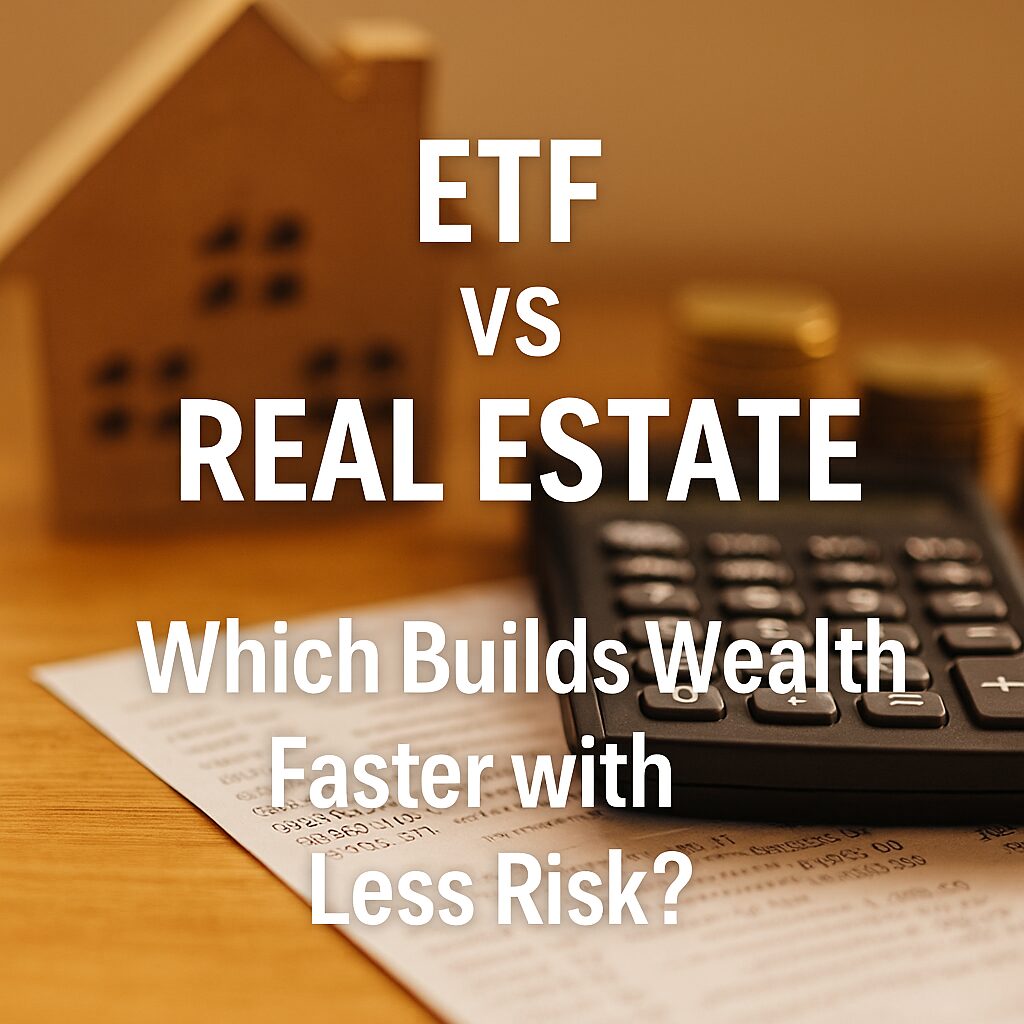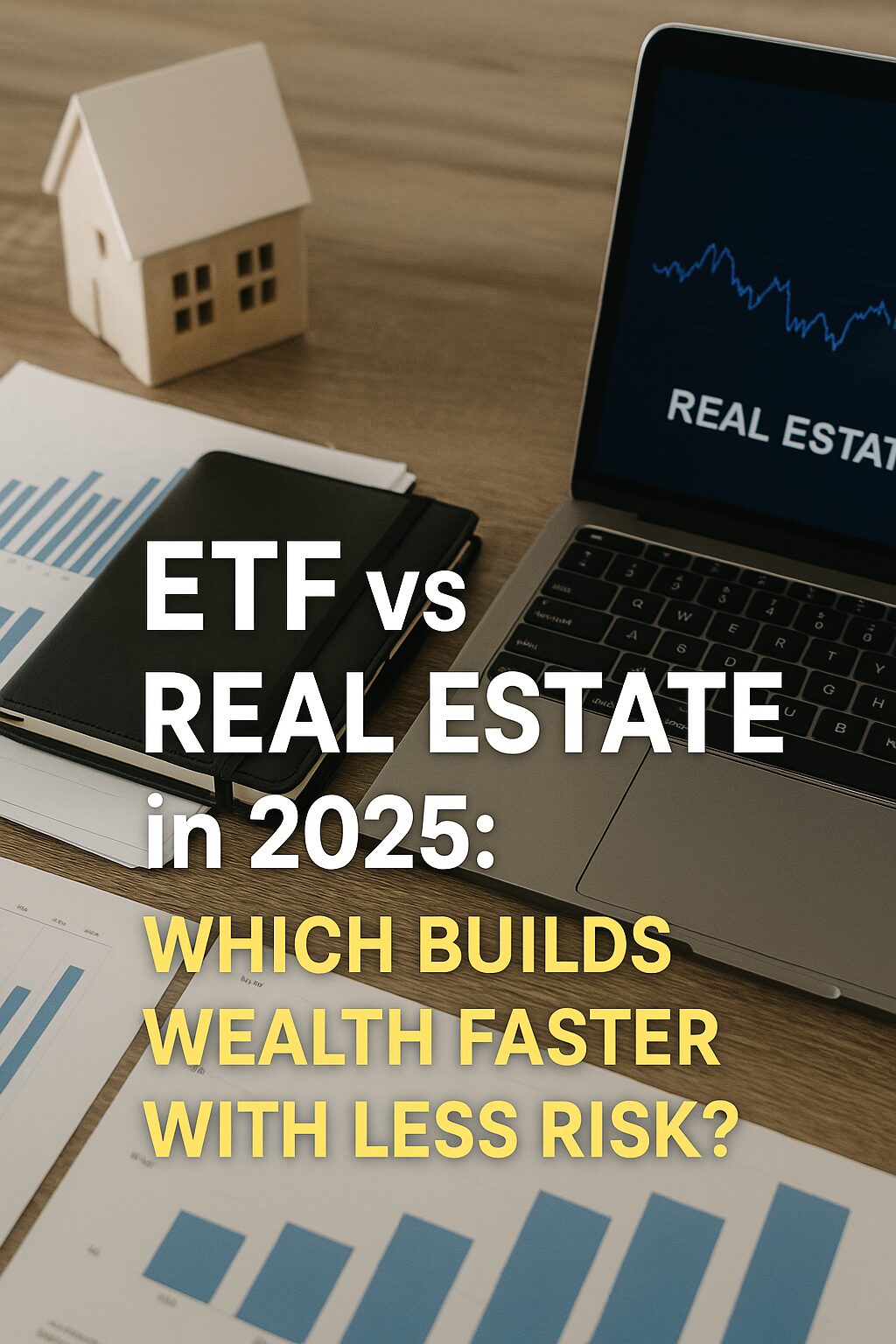Introduction
If you’re trying to decide where to put your money in 2025—into dividend-paying ETFs or real estate—you’re not alone. With global markets shifting, interest rates fluctuating, and housing affordability becoming more complex, investors want clarity. This article dives deep into both options and evaluates which one helps build wealth faster, and with less risk, in today’s economic climate.
What We Mean by ‘Building Wealth’
Wealth-building isn’t just about appreciation. It’s about:
- Consistent cash flow
- Asset appreciation
- Tax advantages
- Low maintenance
- Liquidity
In this article, we evaluate ETFs and real estate across all five dimensions.
1. Initial Capital Required
ETF
- You can start with as little as $100.
- Commission-free trading platforms (e.g., Fidelity, Charles Schwab) allow dollar-cost averaging.
- Fractional shares are available.
Real Estate
- Requires high upfront costs: down payment, closing costs, inspections, etc.
- Average U.S. down payment: $30,000–$60,000+
- Limited liquidity.
Verdict: ETFs are significantly more accessible for beginner investors.
2. Monthly Cash Flow
ETF
- High-dividend ETFs like JEPI, VYM, and SCHD can yield 4–8% annually.
- Paid monthly or quarterly.
- Can be reinvested automatically.
Real Estate
- Rental income can be steady but is often offset by:
- Maintenance
- Vacancy periods
- Property taxes and management fees
Verdict: ETFs provide predictable, hands-off cash flow. Real estate requires active management.
3. Risk Profile
ETF
- Subject to market volatility.
- However, ETFs are diversified and highly liquid.
- No tenant issues, repair costs, or legal liabilities.
Real Estate
- Property value depends on location, economy, and demand.
- Vulnerable to damage, tenant risk, market downturns.
Verdict: ETFs are lower risk in terms of management and diversification.
4. Tax Efficiency
ETF
- Qualified dividends taxed at lower capital gains rates.
- Favorable if held in Roth IRA or tax-advantaged accounts.
Real Estate
- Mortgage interest, depreciation, and expenses are tax-deductible.
- Long-term capital gains and 1031 exchanges can defer taxes.
Verdict: Real estate offers deeper tax deductions, but ETFs win in simplicity and hands-off benefits.
5. Liquidity & Flexibility
ETF
- Can sell any time during market hours.
- Easily rebalanced.
Real Estate
- Property sales can take weeks or months.
- Difficult to access equity without refinancing.
Verdict: ETFs are far more flexible and liquid.
6. Long-Term Performance (Case Study)
ETF Portfolio: SCHD + VYM + JEPI
- $100K invested in 2013 = ~$250K by 2023
- Annualized return: ~9% with dividends reinvested
Real Estate: $100K Property in 2013
- Home value: ~$180K by 2023
- Net after taxes, repairs, and management: ~6% annualized
Verdict: In many U.S. markets, ETFs outperformed real estate over the past decade.
When Real Estate Might Win
- If you’re using leverage effectively
- If you have property management systems in place
- In appreciating markets with low tax burdens
When ETFs Might Win
- If you want passive income
- If you want hands-off diversification
- If your goal is flexibility and scalability
Conclusion
Both ETFs and real estate can build wealth in 2025, but they suit different investor profiles. ETFs offer easier entry, less stress, and high liquidity. Real estate offers more control and deeper tax benefits—but comes with higher risk and complexity.
If you’re seeking a scalable, hands-off way to build long-term income in 2025, ETFs are likely the better bet.
Next in Series: Top 5 High Dividend Stocks in the U.S. for Passive Income in 2025
ETF vs 부동산 (2025): 더 빠르게 부를 쌓고 더 적은 리스크를 안는 쪽은?
2025년, 당신은 어디에 투자해야 할까? 고배당 ETF일까, 아니면 부동산일까? 세계 경제는 급변하고 있고, 금리는 요동치며, 주택 가격은 접근성이 갈수록 낮아지고 있음. 이 글에서는 두 자산군을 깊이 비교 분석하고, 어떤 쪽이 더 빠르게 부를 축적할 수 있으며, 리스크는 더 적은지를 철저히 따져봄.
‘부를 쌓는다’는 의미는 무엇인가?
단순한 자산 가격 상승만이 전부가 아님. 다음의 5가지 요소가 결합되어야 진정한 부의 축적이라 할 수 있음:
- 지속적인 현금 흐름
- 자산 가치 상승
- 세금 혜택
- 낮은 유지 비용
- 유동성
이 글에서는 위 다섯 요소를 기준으로 ETF와 부동산을 비교함.
1. 초기 투자금
ETF
- 최소 $100부터 시작 가능
- 수수료 없는 거래 플랫폼(예: Fidelity, Charles Schwab)에서 소액 분할 매수 가능
- 소수 단위 매수 가능 (fractional shares)
부동산
- 높은 초기 자본 필요: 계약금, 마감 비용, 점검비 등
- 미국 평균 계약금: $30,000 ~ $60,000 이상
- 유동성 거의 없음
결론: ETF가 초보자에게 훨씬 접근성이 높음
2. 월 수익 구조
ETF
- JEPI, VYM, SCHD 등 고배당 ETF의 연 수익률: 4~8%
- 매월 또는 분기마다 배당 지급
- 자동 재투자 기능 가능
부동산
- 임대 수익은 존재하나 다음 요인에 의해 차감됨:\n – 유지보수
- 공실 기간
- 재산세 및 관리 수수료
결론: ETF는 예측 가능하고 수동적인 수익 제공. 부동산은 관리가 필수임
3. 리스크 프로필
ETF
- 시장 변동성 존재
- 그러나 ETF는 분산 투자되어 있고, 유동성이 높음
- 세입자 문제, 수리비용, 법적 리스크 없음
부동산
- 지역, 경기, 수요에 따라 가치가 좌우됨
- 손상, 공실, 시장 침체 등의 리스크 존재
결론: ETF가 관리 리스크나 분산 면에서 유리함
4. 세금 효율성
ETF
- Qualified Dividend는 낮은 세율 적용
- Roth IRA 같은 세제 혜택 계좌에서 보유 시 매우 유리
부동산
- 이자비용, 감가상각, 각종 비용 공제 가능
- 장기보유 시 양도소득세 감면, 1031 교환으로 세금 이연 가능
결론: 부동산이 세금 공제는 더 많지만, ETF가 더 단순하고 손쉬움
5. 유동성과 유연성
ETF
- 시장 개장 중 언제든 매도 가능
- 포트폴리오 재조정도 용이함
부동산
- 매각까지 수주~수개월 소요
- 자산화된 금액 접근 어려움 (대출·리파이낸싱 필요)
결론: ETF가 훨씬 유동적이고 유연함
6. 장기 성과 비교 (사례 연구)
ETF 포트폴리오: SCHD + VYM + JEPI
- 2013년 $100,000 투자 → 2023년 약 $250,000
- 연평균 수익률: 약 9% (배당 재투자 기준)
부동산: 2013년 $100,000 주택
- 2023년 주택 가치: 약 $180,000
- 세금, 수리비, 관리비 제외 후 연평균 수익률: 약 6%
결론: 많은 미국 시장에서는 ETF가 부동산보다 더 나은 성과를 기록함
부동산이 유리한 경우
- 레버리지를 효과적으로 활용할 수 있을 때
- 체계적인 관리 시스템이 구축되어 있을 때
- 낮은 세금의 상승 시장에 투자할 경우
ETF가 유리한 경우
- 패시브 인컴을 원할 때
- 분산과 자동화를 추구할 때
- 유연성과 확장성을 중요시할 때
결론
ETF와 부동산 모두 2025년에 부를 쌓을 수 있는 수단임.
하지만 접근성, 관리 편의성, 유동성, 그리고 확장성 면에서는 ETF가 앞섬. 반면, 부동산은 더 많은 세금 혜택과 통제권을 제공하지만, 높은 리스크와 복잡성을 수반함.
2025년 현재, 장기 수익과 패시브 시스템 구축을 원한다면 ETF가 더 현명한 선택이 될 수 있음.
다음 글 예고
Top 5 High Dividend Stocks in the U.S. for Passive Income in 2025

